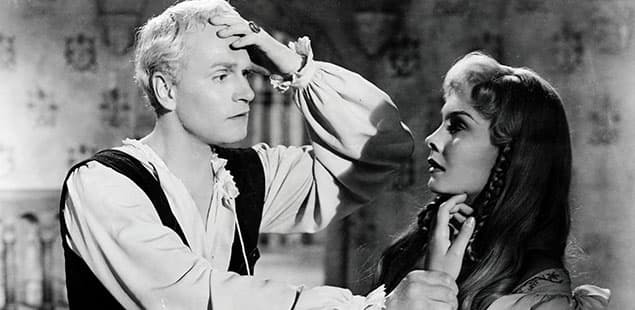Hamlet
Critique • Quotes • At the movies
 Page from First Folio, 1623
Page from First Folio, 1623Written
1599–1601
First performed
1601 or 1602
First published
1603, in the First Quarto
Literary form
Play
Genres
Tragedy
Writing language
English
Author's country
England
Length
Five acts, 4,042 lines, approx. 29,000 words

Laurence Olivier is magnetic as Hamlet and Jean Simmons radiant as Ophelia in 1948Hamlet.
A Hamlet for all occasions
Hamlet (1948): Film, 155 minutes; director Laurence Olivier; featuring Olivier, Eileen Herlie, Jean Simmons, Basil Sydney, Norman Wooland, Terence Morgan
There have been literally dozens of Hamlets on film, television and other video. As on stage, the role of Hamlet seems in the movies to be the one that every male star dreams of portraying, perhaps to show he is more than just a film star, that he has serious acting chops.
The most famous of the video Hamlets may be the 1948 British film directed by and starring Laurence Olivier. It's black and white, but for my money is still one of the most dramatic and interesting Hamlets.
For a classical actor, Olivier is surprisingly unawed by the master's words—he cut and revised the text so much that he sometimes gets a co-writing credit on the film alongside Shakespeare. He has also cleverly compressed and melded scenes. Still, even with only two-thirds of the dialogue, the movie is over two and a half hours long.
It's a dark version of Hamlet. Comedy has been played down, with the Rosencrantz and Guildenstern subplot dropped entirely—much to the dismay of Shakespearean buffs. Only the minor contribution of the poncey Osric, played by a very young Peter Cushing, remains of comic relief.
Olivier himself at 41 is really too old for the role, though with his lithe body and short-cropped fair hair he's sexy enough, reminding me of Sting. He's thirteen years older than the actress (Eileen Herlie) who plays his mother, the queen. No wonder he also downplays the oedipal sexual tension between the two, which other popular versions of Hamlet have exploited.
But Olivier is nonetheless magnetic. He has an ability to deliver complex lines seemingly effortlessly. He is also very still at times. In the first scene in which we see him, he sits quietly in a chair in the foreground while the court bustles about him and other characters carouse. They eventually all depart, leaving us focused on the lone man ruminating in the chair. When he gets up to deliver his first soliloquy, wandering about the vacant court, we are all attention. The speech itself is presented as a well-timed combination of spoken words and thoughts in a voice-over. Throughout the play, Olivier the director offers dialogue with whatever cinematic technique works most effectively.
The famously dramatic "To be or not to be" soliloquy in Laurence Olivier's Hamlet.
With one exception, this Hamlet concentrates exclusively on the title character. Others get their time in the limelight only if exposition is needed to take us to the next scene with the prince. The exception is for Ophelia. Often watching various Hamlets I find Ophelia a bore—I don't care what happens to this mooning, ineffectual, wispy young woman, whose role as love interest is wasted. She is needed only to die and thereby set up the final duel between her brother and Hamlet.
But Jean Simmons is a radiant, dynamic Ophelia, so her madness at the hands of Hamlet is affecting. She's given an dreamily compelling death scene, floating down the river, sinking with the flowers.
Other great British actors in supporting roles include Anthony Quayle as Marcellus and Stanley Holloway as the gravedigger. Cushing's later horror-film co-star, Christopher Lee, is supposedly a spear carrier, though I couldn't spot him.
Olivier starts the film with an introduction quoting some later dialogue about the single flaw in a man's character that can lead to his downfall and then intones, "This is a tragedy about a man who could not make up his mind." Not an interpretation I agree with, but this and other occasionally unusual twists he creates for scenes we thought we already knew makes this a fascinating Hamlet. The "To be or not to be" monologue, for example, is an open consideration of suicide, rejected finally when he drops the dagger over a cliff. In the final scene it is hinted by glances that the queen drinks the poison intended for Hamlet not entirely by accident but to save him from it.
This is the only film of Hamlet to ever win Academy Awards, gathering four, including for best picture and best actor (Olivier). Supporting actress Simmons was also nominated, as was Olivier's direction.
— Eric

